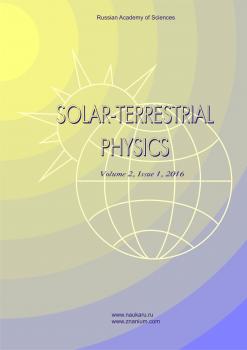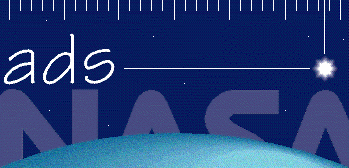Irkutsk, Russian Federation
Irkutsk, Russian Federation
The paper considers the implementation of algorithms for automatic search for signals scattered by meteor trails according to EKB ISTP SB RAS radar data. In general, the algorithm is similar to the algorithms adopted in specialized meteor systems. The algorithm is divided into two stages: detecting a meteor echo and determining its parameters. We show that on the day of the maximum Geminid shower, December 13, 2016, the scattered signals detected by the algorithm are foreshortening and correspond to scattering by irregularities extended in the direction of the meteor shower radiant. This confirms that the source of the signals detected by the algorithm is meteor trails. We implement an additional program for indirect trail height determination. It uses a decay time of echo and the NRLMSIS-00 atmosphere model to estimate the trail height. The dataset from 2017 to 2019 is used for further testing of the algorithm. We demonstrate a correlation in calculated Doppler velocity between the new algorithm and FitACF. We present a solution of the inverse problem of reconstructing the neutral wind velocity vector from the data obtained by the weighted least squares method. We compare calculated speeds and directions of horizontal neutral winds, obtained in the three-dimensional wind model, and the HWM-14 horizontal wind model. The algorithm allows real-time scattered signal processing and has been put into continuous operation at the EKB ISTP SB RAS radar.
meteor trails, HF radar, atmosphere dynamics, automatic detection
1. Arnold N.F., Cook P.A., Robinson T.R., Lester M., Chapman P.J., Mitchell N. Comparison of D-region Doppler drift winds measured by the SuperDARN Finland HF radar over an annual cycle using the Kiruna VHF meteor radar. Ann. Geophys. 2003, vol. 21, no. 10, pp. 2073-2082. DOI:https://doi.org/10.5194/angeo-21-2073-20033.
2. Berngardt O.I., Voronov A.L., Grkovich K.V. Optimal signals of Golomb ruler class for spectral measurements at EKB SuperDARN radar: Theory and experiment. Radio Sci. 2015, vol. 50, no. 6, 2014RS005589, pp. 486-500. DOI:https://doi.org/10.1002/2014RS005589.
3. Baumjohann W., Treumann R.A. Basic Space Plasma Physics. London: Imperial College Press, 1996. 340 p. DOI:https://doi.org/10.1142/p015.
4. Briczinski S.J., Mathews J.D., Meisel D.D. Statistical and fragmentation properties of the micrometeoroid flux observed at Arecibo. J. Geophys. Res.: Space Phys. 2009, vol. 114, no. A4, A04311. DOI:https://doi.org/10.1029/2009JA014054.
5. Campbell-Brown M.D. High resolution radiant distribution and orbits of sporadic radar meteoroids. Icarus. 2008, vol. 196, no. 1, pp. 144-163. DOI:https://doi.org/10.1016/j.icarus.2008.02.022.
6. Close S., Hunt S.M, McKeen F.M., Minardi M.J. Characterization of Leonid meteor head echo data collected using the VHF-UHF Advanced Research Projects Agency Long-Range Tracking and Instrumentation Radar (ALTAIR). J. Geophys. Res. 2002, vol. 37, iss. 1, pp. 9-1. DOI:https://doi.org/10.1029/2000RS002602.
7. Deegan N.F., Fitzpatrick R., Forti G., Grossi M., Schaffner M., Southworth R. Study of meteor wind measurement techniques. V. 1. Final report. Contract AF 19(628)-3248. Defense Technical Information Center, 1970. 128 p.
8. Erickson P.J., Lind F.D., Wendelken S.M., Faubert M.A. Meteor head echo observations using the Millstone Hill UHF incoherent scatter radar system. Meteoroids 2001 Conference. ESA Special Publ., 2001, vol. 495, pp. 457-463.
9. Hall G.E., MacDougall J.W., Moorcroft D.R., St.-Maurice J.P., Manson A.H., Meek C.E. Super Dual Auroral Radar Network observations of meteor echoes. J. Geophys. Res. 1997, vol. 102, iss. A7, pp. 14603-14614. DOI:https://doi.org/10.1029/97JA00517.
10. Hall C.M., Aso T., Tsutsumi M., Nozawa S., Meek C., Manson A. Comparison of meteor and medium frequency radar kilometer scale {MLT} dynamics at 70º N. J. Atmos. Solar-Terr. Phys. 2006. vol. 68, no. 3-5, pp. 309-316. DOI:https://doi.org/10.1016/j.jastp.2005.03.025.
11. Janches D., Dyrud L.P., Broadley S.L., Plane J.M.C. First observation of micrometeoroid differential ablation in the atmosphere. Geophys. Res. Lett. 2009, vol. 36, no. 6, L06101. DOI:https://doi.org/10.1029/2009GL037389.
12. Jenkins B., Jarvis M.J. Mesospheric winds derived from SuperDARN HF radar meteor echoes at Halley, Antarctica. Earth, Planets and Space. 1999, vol. 51, pp. 685-689. DOI:https://doi.org/10.1186/BF03353226.
13. Jenkins B., Jarvis M.J., Forbes D.M. Mesospheric wind observations derived from Super Dual Auroral Radar Network (SuperDARN) HF radar meteor echoes at Halley, Antarctica: Preliminary results. Radio Sci. 1998, vol. 33, no. 4, pp. 957-965. DOI:https://doi.org/10.1029/98RS01113.
14. Jones W., Jones J. Ionic diffusion in meteor trains. J. Atmos. Terr. Phys. 1990, vol. 52, pp. 185-191. DOI:https://doi.org/10.1016/0021-9169(90)90122-4.
15. Jones J., Brown P., Ellis K.J., Webster A.R., Campbell-Brown M., Krzemenski Z., Weryk R.J. The Canadian Meteor Orbit Radar: system overview and preliminary results. Planet. Space Sci. 2005, vol. 53, pp. 413-421. DOI:https://doi.org/10.1016/j.pss.2004.11.002.
16. Kam H., Kim Y.H., Mitchell N.J., Kim J.-H., Lee C. Evaluation of estimated mesospheric temperatures from 11-year meteor radar datasets of King Sejong Station (62° S, 59° W) and Esrange (68° N, 21° E). J. Atmos. Solar-Terr. Phys. 2019, vol. 196, pp. 105148. DOI:https://doi.org/10.1016/j.jastp.2019.105148.
17. Kero J., Szasz C., Nakamura T., Meisel D.D., Ueda M., Fujiwara Y., Terasawa T., Nishimura K., Watanabe J. The 2009-2010 MU radar head echo observation programme for sporadic and shower meteors: radiant densities and diurnal rates. Mon. Not. Royal Astron. Soc. 2012, vol. 425, no. 1, pp. 135-146. DOI:https://doi.org/10.1111/j.1365-2966.2012.21407.x.
18. Korotyshkin D., Merzlyakov E., Sherstyukov O., Valiullin F. Mesosphere/lower thermosphere wind regime parameters using a newly installed SKiYMET meteor radar at Kazan (56° N, 49° E). Adv. Space Res. 2019, vol. 63, no. 7, pp. 2132-2143. DOI:https://doi.org/10.1016/j.asr.2018.12.032.
19. Li Y., Zhou Q., Scott M., Milla M. A Study on meteor head echo using a probabilistic detection model at Jicamarca. J. Geophys. Res.: Space Phys. 2020, vol. 125, no. 1, e2019JA027459. DOI:https://doi.org/10.1029/2019JA027459.
20. Lovell A.C.B. Meteor Astronomy. Oxford, Clarendon Press., 1954, 463 p.
21. Mathews J.D., Doherty J., Wen C.H., Briczinski S., Janches D., Meisel D. An update on UHF radar meteor observations and associated signal processing techniques at Arecibo Observatory. J. Atmos. Solar-Terr. Phys. 2003, vol. 65, no. 10, pp. 1139-1149. DOI:https://doi.org/10.1016/j.jastp.2003.07.009.
22. Mathews J.D., Briczinski S.J., Malhotra A., Cross J. Extensive meteoroid fragmentation in V/UHF radar meteor observations at Arecibo Observatory. Geophys. Res. Lett. 2010, vol. 37, no. 4, L04103. DOI:https://doi.org/10.1029/2009GL041967.
23. McKinley D.W.R. Meteor Science and Engineering. New York, McGraw-Hill, 1961, 309 p.
24. Nakamura T., Tsuda T., Tsutsumi M., Kita K., Uehara T., Kato S., Fukao S. Meteor wind observations with the MU radar. Radio Sci. 1991, vol. 26, no 04, pp. 857-869. DOI:https://doi.org/10.1029/91RS01164.
25. Parris R.T. Design and Implementation of a Meteor Tracking Retrofit for the HF Radar at Kodiak Island, Alaska. Thesis (M. S.) University of Alaska Fairbanks, 2003, 123 p.
26. Premkumar B., Reddy K.C., Yellaiah G., Kumar K.K. Seasonal variations in vertical distribution of meteor decay time as observed from meteor radars at 8.5° N and 80° N. Adv. Space Res. 2019, vol. 63, no..5, pp. 1661-1669. DOI:https://doi.org/10.1016/j.asr.2018.11.019.
27. Ribeiro A.J., Ruohoniemi J.M., Ponomarenko P.V., Clausen L.B.N., Baker J.B.H., Greenwald R.A., Oksavik, K., de Larquier S. A comparison of SuperDARN ACF fitting methods. Radio Sci. 2013, vol. 48, no. 3, pp. 274-282. DOI:https://doi.org/10.1002/rds.20031.
28. Shepherd S.G. Elevation angle determination for SuperDARN HF radar layouts. Radio Sci. 2017, vol. 52, no. 8, pp. 938-950. DOI:https://doi.org/10.1002/2017RS006348.
29. Szasz C., Kero J., Meisel D.D., Pellinen-Wannberg A., Wannberg G., Westman A. Orbit characteristics of the tristatic EISCAT UHF meteors. Mon. Not. Royal Astron. Soc. 2008, vol. 388, no. 1, pp. 15-25. DOI:https://doi.org/10.1111/j.1365-2966.2008.13374.x.
30. Thomas R.M., Whitham P.S., Elford W.G. Response of high frequency radar to meteor backscatter. J. Atmos. Terr. Phys. 1988, vol. 50, pp. 703-724. DOI:https://doi.org/10.1016/0021-9169(88)90034-7.
31. Tsutsumi M., Nakamura T., Holdsworth D., Reid I. Meteor observations with an MF radar. Earth, Planets and Space. 1999, vol. 51, no. 7, pp. 691-699. DOI:https://doi.org/10.1186/BF03353227.
32. Tsutsumi M., Yukimatu A.S., Holdsworth D.A., Lester M. Advanced SuperDARN meteor wind observations based on raw time series analysis technique. Radio Sci. 2009, vol. 44, no. 2, RS2006. DOI:https://doi.org/10.1029/2008rs003994.
33. Yukimatu A.S., Tsutsumi M. A new SuperDARN meteor wind measurement: Raw time series analysis method and its application to mesopause region dynamics. Geophys. Res. Lett. 2002, vol. 29, no. 20, pp. 42-1-42-4. DOI: 0.1029/2002GL015210.
34. Zhu Q., Dinsmore R., Gao B., Mathews J.D. High-resolution radar observations of meteoroid fragmentation and flaring at the Jicamarca Radio Observatory. Mon. Not. Royal Astron. Soc. 2016, vol. 457, no.2, pp. 1759-1769. DOI:https://doi.org/10.1093/mnras/stw070.
35. URL: http://ckp-rf.ru/ckp/3056 (accessed November 20, 2020).


















